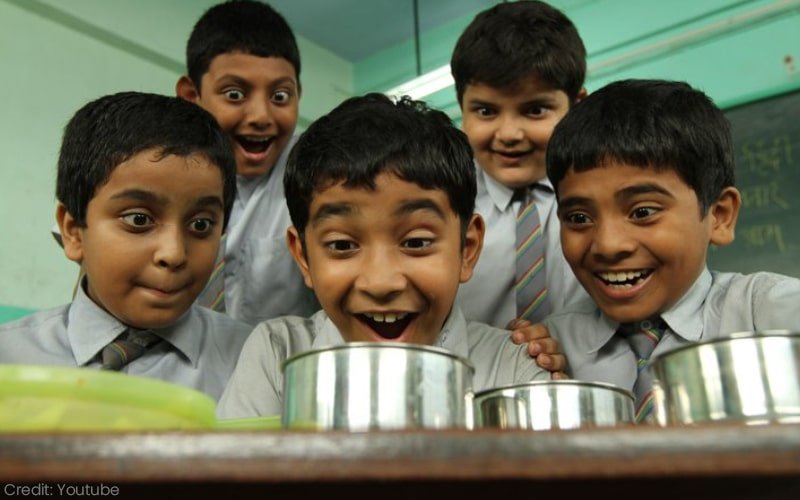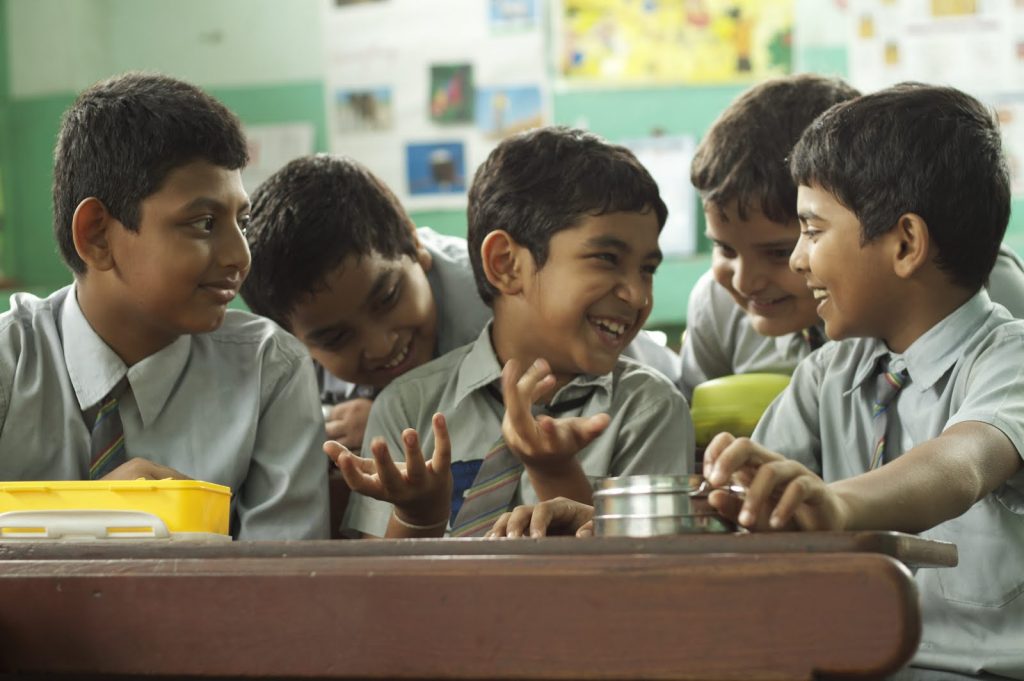At school, recess was a spectacle. We all remember those periods when we peeped into our dabbas and passed snacks around. Eager for the recess bell to go, we looked forward to our food, and friendship. Now, in understanding consumption, the dabba in the Indian context has become instrumental. So in theorising what the tiffin spills — imagination and innocence; focus is brought to this underrated film, Stanley Ka Dabba.
And the problem it deals with is: Why does Stanley, unlike his classmates, not bring a dabba to school?
Hunger is innocent
Stanley, a fourth-grader at Holy Family School in Mumbai, faces the ongoing struggle of not having a lunchbox and relying on his friends to share their food. This situation becomes even more challenging with the arrival of Khadoos, their Hindi teacher. Khadoos harshly reprimands Stanley for eating from his friends’ dabbas and eventually forces him to either bring his lunch or stop attending school altogether. To avoid this, Stanley fabricates stories about having home-cooked meals at home made by his mom and staying away during the break to curb his hunger. When caught by his friends loitering around, he says that his mom and dad are out of town. His friends, seeing more than what meets the eye, decide to share their lunches discreetly until Khadoos discovers this and issues a final ultimatum. Stanley then stops attending school.

Khadoos speaks to Stanley solely because he does not get his dabba and calls him a rat who hogs others’ food. While Stanley’s friends are happy to share, Khadoos blames the younger boy, believing he ate his share. Khadoos’ inability to understand Stanley’s situation highlights a lack of empathy and acceptance that contrasts sharply with the understanding shown by Stanley’s peers.
Khadoos’ anger and projection stem from his gluttony and the fact that he, too, does not bring a dabba. He steals food from the staff and fills his stomach with their meals, classifying Stanley’s hunger as gluttonous because it mirrors his own. The dabba becomes a signifier—a permit to sit in class and be part of the group. Khadoos’ inability to see Stanley’s hunger raises a profound question: Is a child’s hunger not imperative, or innocent?
The stark contrast between students who bring their tiffins and Stanley, who does not, intensifies as the tiffin evolves into a marker of character rather than just a simple meal. The reason behind Stanley’s missing dabba is unveiled towards the film’s end, underscoring its symbolic importance. Khadoos’s focus on the dabba as a marker of character leaves no room to consider the child’s genuine innocence.
One fine day, Stanley shows up with his dabba and opens it in front of Khadoos. This confrontation, though innocent, strikes Khadoos deeply, leading him to resign and apologise to Stanley. The film then poignantly reveals to us that Stanley is an orphan and does not have a mother he talks about every day. The homecooked meals, we guess, were never made, and he lives with his abusive uncle in a restaurant where he works as a child labourer.
The film also devises how the space from where food comes can be a huge insecurity for Stanley. We are not taken into consideration to find out how Stanley was finally helped by Akram, the one who works with Stanley at the dhaba. And when he finally is, it most definitely has to be his “mother’s cooking” to make that space translatable in his life outside.
Lastly, the one thing that survives is his innocence stemming from his imagination of his mother, which comes alive every time he talks about food. This narrative will always be relevant as “maa ke hath ka khana” is absent in a fourth grader’s life, evoking the most sympathy for the child from the audience. Whether Stanley has memories of his mother’s cooking or not, his innocent pretence allows him to escape into a world of imagined affection and classify his hunger as imperatively innocent.
What weighs heavy class or gluttony?
Stanley’s character embodies the reality of being one of the countless children in the workforce, a segment where many toil without pay, often alongside their family members. This socio-economic backdrop is the final breakthrough in Khadoos’ and Stanley’s confrontation. Khadoos, unaware of Stanley’s background, only sees a child who seems to defy his authority and stand in his way to get his share of food. Khadoos’ projection is harsh and apathetic, highlighting how emasculated his reasons for not bringing his dabba could be.

His sin of gluttony carries with it the burden of class. He personifies the abuse of his rank and power, attempting to consume Stanley’s share while the young boy is already deprived. It is also ironic that Stanley is surrounded by food at work in his uncle’s restaurant, yet he longs for the home-cooked meals that symbolise love and care. The restaurant is classed and engendered for Stanley as well; where male power is coercive just like it is at school with Khadoos. Stanley bravely attempts to shed this identity at school by pretending to have a mother who prepares his lunch to compensate for the maternal tenderness he has missed out on.
Stanley’s fib that his mother made him a dabba also helps him translate the leftover restaurant food for his peers. It is the said maternal food that makes him parley with Khadoos. Stanley’s missing dabba at school generates both intrigue and Khadoos’s anger, turning the tiffin into a symbol of character rather than just a meal. This emphasis on the dabba leaves no space to acknowledge Stanley’s genuine innocence. As Arjun Appadurai references Marriott (1978), Indian thought links intimacy closely with social rank — suggesting that in relationships marked by greater inequality, food transactions become more intimate, evident in both the types of food shared and the manner of sharing.
Khadoos’s inability to recognise Stanley’s hunger as innocent underscores the film’s critique of societal structures that marginalise the weak.
In this context, Stanley’s pretence of having a mother who prepares his lunch functions as a semiotic device, helping him to align with his peers and fit into the school’s social structure. By creating the illusion of maternal care through his dabba, Stanley attempts to bridge the gap imposed by the coercive power dynamics at school and in his life outside.
The film portrays a world divided between those who have nurturing families and dabbas, and those like Khadoos and Stanley, who lack such warmth. Given this stark contrast, it’s hardly surprising that Khadoos is unremarkably bitter.
Both Khadoos and Stanley lack food from home and particularly maternal love. Khadoos’s inability to recognise Stanley’s hunger as innocent underscores the film’s critique of societal structures that marginalise the weak. The grotesque act of Khadoos stealing food from children’s tiffins and the staff’s becomes a metaphor for a deeper class struggle, revealing the stark divide between those who have and those who have not.
But the wholesome, slice-of-life tone the film guides us with gives us hope because Stanley can imagine. Khadoos, however cannot. So to make sense of this remarkable gluttony channelled in a larger unremarkable class struggle we are forced to imagine for Khadoos and ask— what weighs heavy, class or gluttony?
We imagine our mothers
For Stanley, imagining that his mother prepares his meals grants him a sense of agency. His mother must exist beyond the confines of English essays; she comes alive through the food he pretends she has made. The film poignantly concludes with a montage of Stanley sharing his mom’s food with his teachers and friends. He adds happy instances of how she bought cheap potatoes and woke up early to cook just for him. As he serves his classmates and teachers, he mirrors the service he provides at his uncle’s restaurant. This irony is not epiphanic but sad, making the film remarkably compelling for a Lacanian reading of Stanley’s actions.

His search for motherhood oscillates between a Mother Mary statue outside school, and his teacher Rosy but ends with his mom-cooked meals as it grants him a sense of agency. According to Lacan, when a child lacks a primary caregiver, symbolic acts often arise to manage that absence. Stanley’s tiffin, which he claims is filled with his mother’s cooking, symbolises her presence and helps him cope with her absence.
The dabba functions as a transitional object for Stanley, bridging the emotional gap left by his absent mother. This concept, as described by Lacan, represents a tangible link to his mother, providing him with comfort and stability amidst his challenging reality. Through this symbolic act, Stanley maintains a sense of continuity and normalcy, finding solace in a world where food embodies maternal love.
Ultimately, the film doesn’t offer grand revelations but persists in its simple, yet profound, manner. Stanley’s act of sharing and the imagined presence of his mother reflect deep resilience and a poignant reminder of how we cope with absence and find comfort in the familiar. It prompts us to consider how our mothers, at all times, live in the realm of imagination, as do their roles. Whether Stanley has real memories of his mother’s cooking or not, his innocent pretence allows him to escape into a world of imagined affection striving to ensure us unusually so, that he may not grow up to be Khadoos.




